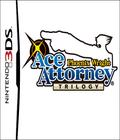Phoenix Wright: Ace Attorney Trilogy is a collection of the first three games in the Ace Attorney franchise: Phoenix Wright: Ace Attorney, Phoenix Wright: Ace Attorney – Justice For All and Phoenix Wright: Ace Attorney – Trials and Tribulations. Each of the three games is presented almost unaltered from the original Nintendo DS release. As such, before this review goes any further, that should give you a clear idea of the appeal of this package. If you're a Phoenix Wright fan and looking to re-experience the classics, it's ideal for you. If you're new to the franchise, it's also a fantastic starting place.
Phoenix Wright: Ace Attorney follows the adventures of the titular defense attorney who makes a living taking on difficult cases. Unfortunately, the criminal system is rather biased against the defendant, and Wright always believes in the innocence of his clients. Each case involves an unfortunate person who's accused of heinous crimes. Every case is a distinct story, but throughout each of the three games, there is an overall plot that eventually comes to a head in the final case. Wright must prove who is innocent and who deserves punishment.
The writing and excellent localization are the stars of the show in Phoenix Wright. The games are effectively visual novels with some light puzzle elements, so they're carried by the strength of their characters and writing. The Phoenix Wright franchise is remarkably silly in the original Japanese, but the English translation takes it to a new level. Set in a fusion of Japan and Los Angeles, it wholeheartedly embraces a ridiculous worldview. Characters are bizarre and humorous, and more often than not, the writing is funny, though the humor is balanced by some strong character writing. Phoenix Wright is an excellent straight man, and his support cast is likeable. The murder mysteries are an acquired flavor, but the mysteries are engaging enough and full of twists to keep you engaged.
Phoenix Wright is not a franchise for those with a low tolerance for silly. Wright embraces the wackiness well beyond the point of absurdity and intentionally contrasts it with some dark subject matter. Brutal murders can lead to comedy, and the contrast can be bewildering if you're not prepared for it. The first game, Phoenix Wright: Ace Attorney, is probably the most down to earth of the trilogy. Magic and mysticism play an increasingly greater part in each successive game, and in several cases, they overtake the more grounded aspects of the plot. If you're looking for a serious murder mystery, you won't find it here.
All three of the games in the Phoenix Wright Trilogy play in roughly the same fashion. The games are divided into two parts: Investigation and Trial. Investigation involves searching a crime scene to learn who committed the crime — and why. You move from location to location and tap various places on the touch-screen looking for clues or hints. Occasionally, you'll have to interview a witness to find more clues, but this is done almost entirely by selecting dialogue choices from a list or occasionally presenting a piece of evidence. The later games offer minor gimmicks, such as Phoenix Wright's ability to see "Truth Locks" that he can break with evidence, but it's a minor change to the core formula. The sole exception to this is the final case in the first game. This case was not present in the original Gameboy Advance release of the Phoenix Wright games and was added as a bonus feature when the title was released for the original DS. This case features a few touch-screen gimmicks not present anywhere else in the game. They are a minor variation in the otherwise rigid formula.
In all three games, Investigation is easily the weakest segment. It's especially apparent coming off games like Dual Destinies, which do a lot to streamline the process. You can see a clear advancement as the games progress, and the final game is better than the first. The investigations are very static, so you go to a location, click everything on-screen, select every dialogue option, and continue. There's no chance for failure and no way to do things wrong, so the process feels tedious. If this is your first time through the game, you'll probably pay more attention to the strong writing, but the tedium stands out on replays.
The Trial segments are the real star of the Ace Attorney show. Once you've completed your investigation, you're taken to trial, where you compete with the prosecuting attorney to prove the guilt or innocence of various characters. You can do this by cross-examining witnesses and presenting evidence. Make the right choices, and you can break through a lie in a witness statement. The wrong ones will get you penalized and can lead to a tragic "game over." The puzzles are simple but require you to play close attention. A single misleading word or tiny contradiction is often exactly what is needed to break a case wide open.
The core gameplay in Phoenix Wright's trial segments is simple but incredibly engaging. A big part of this has to do with the pacing as you rapidly present evidence, press the witnesses, and see the gradual breakdown of their lies. There's no variation in the cases, so once you've seen them once, you've seen them a thousand times. The writing, combined with excellent music and the sheer fun of presenting a firm objection to a contradiction, keeps them engaging during a replay. It isn't the sort of thing you'll go through time and time again, but it certainly does its job.
Having said that, all three Phoenix Wright games share a problem that plagues the franchise to this day. Evidence is binary. The right piece must be presented at the right place and the right time, but what you think is the right place or the right time may not be what the game thinks. It's pretty common to get dinged because you chose something that could be the right answer but wasn't the specific right answer. Sometimes this is sensible, and sometimes it requires mind-reading skills. It isn't a game-crippling problem, but it is present throughout the entire trilogy.
The visuals in Phoenix Wright: Ace Attorney Trilogy are based on the iOS release of the game. Fortunately, some of the awkwardness, including graphical glitches and typos, has been cleaned up. The iOS "HD" visuals are still based on the original GBA sprites, and it shows. The character artwork is charming, but it's difficult to ignore the limited camera work and even more minimal frames of animation that make several otherwise cute scenes look rather awkward. It isn't much different than the original release, but it stands out more, especially in comparison to the far more detailed Dual Destinies. There's a certain charm to the graphics, but even a fresh coat of paint can't disguise their age. The text speed received a much-needed speed increase, but that is about the extent of the meaningful updates. There are 3-D features, but the game wasn't designed for them, and I quickly turned them off.
The soundtrack is still excellent. Phoenix Wright has always had amazing music, and it is preserved here. You also have the option to change the game to the Japanese text and voice work, although it's hard to imagine many using this feature.
Phoenix Wright: Ace Attorney Trilogy is a fantastic collection for your gaming dollar. It contains three of the most enjoyable (and ridiculous) Phoenix Wright games for the Nintendo DS in one convenient package. The only downside to the game, beyond the innate flaws in the titles, is that it isn't really much of an improvement. It's a collection that lacks basic new features that are present in many other HD collections. It's a remarkably bare-bones collection, but if you're a fan of the franchise or interested in experiencing the series for the first time, this is your best bet.
Score: 8.0/10
More articles about Phoenix Wright: Ace Attorney Trilogy











 Courtroom hero Phoenix Wright lays down the law in the digital release of Phoenix Wright: Ace Attorney Trilogy seen like never before in clear, high-resolution re-drawn graphics and immersive 3D visuals.
Courtroom hero Phoenix Wright lays down the law in the digital release of Phoenix Wright: Ace Attorney Trilogy seen like never before in clear, high-resolution re-drawn graphics and immersive 3D visuals.





































